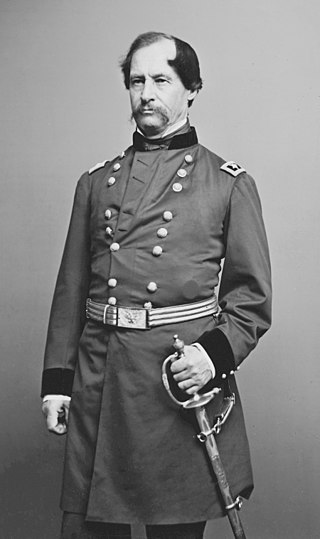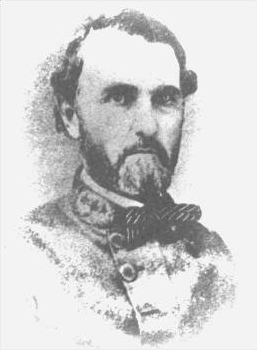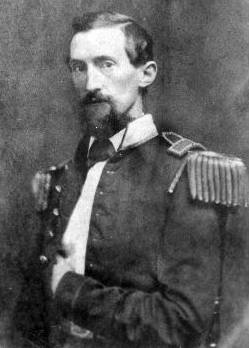
The American Civil War was a civil war in the United States between the Union and the Confederacy, which was formed in 1861 by states that had seceded from the Union. The central conflict leading to war was a dispute over whether slavery should be permitted to expand into the western territories, leading to more slave states, or be prohibited from doing so, which many believed would place slavery on a course of ultimate extinction.

The Confederate States of America (CSA), commonly referred to as the Confederate States (C.S.), the Confederacy, or the South, was an unrecognized breakaway republic in the Southern United States that existed from February 8, 1861, to May 9, 1865. The Confederacy comprised eleven U.S. states that declared secession and warred against the United States during the American Civil War. The states were South Carolina, Mississippi, Florida, Alabama, Georgia, Louisiana, Texas, Virginia, Arkansas, Tennessee, and North Carolina.

Robert Edward Lee was a Confederate general during the American Civil War, toward the end of which he was appointed the overall commander of the Confederate States Army. He led the Army of Northern Virginia—the Confederacy's most powerful army—from 1862 until its surrender in 1865, earning a reputation as a skilled tactician.

David Hunter was an American military officer. He served as a Union general during the American Civil War. He achieved notability for his unauthorized 1862 order emancipating slaves in three Southern states, for his leadership of United States troops during the Valley Campaigns of 1864, and as the president of the military commission trying the conspirators involved with the assassination of U.S. President Abraham Lincoln.

The Confederate States Army, also called the Confederate Army or the Southern Army, was the military land force of the Confederate States of America during the American Civil War (1861–1865), fighting against the United States forces to win the independence of the Southern states and uphold and expand the institution of slavery. On February 28, 1861, the Provisional Confederate Congress established a provisional volunteer army and gave control over military operations and authority for mustering state forces and volunteers to the newly chosen Confederate president, Jefferson Davis. Davis was a graduate of the U.S. Military Academy, and colonel of a volunteer regiment during the Mexican–American War. He had also been a United States senator from Mississippi and U.S. Secretary of War under President Franklin Pierce. On March 1, 1861, on behalf of the Confederate government, Davis assumed control of the military situation at Charleston, South Carolina, where South Carolina state militia besieged Fort Sumter in Charleston harbor, held by a small U.S. Army garrison. By March 1861, the Provisional Confederate Congress expanded the provisional forces and established a more permanent Confederate States Army.

The Killer Angels is a 1974 historical novel by Michael Shaara that was awarded the Pulitzer Prize for Fiction in 1975. The book depicts the three days of the Battle of Gettysburg during the American Civil War, and the days leading up to it: June 29, 1863, as the troops of both the Union and the Confederacy move into battle around the town of Gettysburg, Pennsylvania, and July 1, July 2, and July 3, when the battle was fought. The story is character-driven and told from the perspective of various historical figures from both the Confederacy and the Union. A film adaptation of the novel, titled Gettysburg, was released in 1993.

Shelby Dade Foote Jr. was an American writer, historian and journalist. Although he primarily viewed himself as a novelist, he is now best known for his authorship of The Civil War: A Narrative, a three-volume history of the American Civil War.

The Lost Cause of the Confederacy is an American pseudohistorical and historical negationist myth that claims the cause of the Confederate States during the American Civil War was just, heroic, and not centered on slavery. First enunciated in 1866, it has continued to influence racism, gender roles, and religious attitudes in the Southern United States into the 21st century. Historians have dismantled many parts of the Lost Cause mythos.

Robert EmmettRodes was a Confederate general in the American Civil War, and the first of Robert E. Lee's divisional commanders not trained at West Point. His division led Stonewall Jackson's devastating surprise attack at the Battle of Chancellorsville; Jackson, on his deathbed, recommended that Rodes be promoted to major general. Rodes then served in the corps of Richard S. Ewell at the Battle of Gettysburg and in the Overland Campaign, before that corps was sent to the Shenandoah Valley under Jubal Early, where Rodes was killed at the Third Battle of Winchester.
The ten percent plan, formally the Proclamation of Amnesty and Reconstruction, was a United States presidential proclamation issued on December 8, 1863, by United States President Abraham Lincoln, during the American Civil War. By this point in the war, the Union Army had pushed the Confederate Army out of several regions of the South, and some Confederate states were ready to have their governments rebuilt. Lincoln's plan established a process through which this postwar reconstruction could come about.

Alabama was central to the Civil War, with the secession convention at Montgomery, the birthplace of the Confederacy, inviting other slaveholding states to form a southern republic, during January–March 1861, and to develop new state constitutions. The 1861 Alabaman constitution granted citizenship to current U.S. residents, but prohibited import duties (tariffs) on foreign goods, limited a standing military, and as a final issue, opposed emancipation by any nation, but urged protection of African-American slaves with trials by jury, and reserved the power to regulate or prohibit the African slave trade. The secession convention invited all slaveholding states to secede, but only 7 Cotton States of the Lower South formed the Confederacy with Alabama, while the majority of slave states were in the Union at the time of the founding of the Confederacy. Congress had voted to protect the institution of slavery by passing the Corwin Amendment on March 4, 1861, but it was never ratified.

Mississippi was the second southern state to declare its secession from the United States, doing so on January 9, 1861. It joined with six other southern states to form the Confederacy on February 4, 1861. Mississippi's location along the lengthy Mississippi River made it strategically important to both the Union and the Confederacy; dozens of battles were fought in the state as armies repeatedly clashed near key towns and transportation nodes.

St. John Richardson Liddell was a prominent Louisiana planter who served as a general in the Confederate States Army during the American Civil War. He was an outspoken proponent of Southern emancipation of slaves. Following the war, Liddell had a prominent feud with a former Confederate officer, Charles Jones, who eventually murdered Liddell near his home in 1870.

William Wing Loring was an American soldier who served in the armies of the United States, the Confederacy, and Egypt.

African Americans, including former enslaved individuals, served in the American Civil War. The 186,097 black men who joined the Union Army included 7,122 officers and 178,975 enlisted soldiers. Approximately 20,000 black sailors served in the Union Navy and formed a large percentage of many ships' crews. Later in the war, many regiments were recruited and organized as the United States Colored Troops, which reinforced the Northern forces substantially during the conflict's last two years. Both Northern Free Negro and Southern runaway slaves joined the fight. Throughout the course of the war, black soldiers served in forty major battles and hundreds of more minor skirmishes; sixteen African Americans received the Medal of Honor.

Francis Asbury Shoup, a lawyer from Indianapolis, Indiana, became a brigadier general for the Confederate States Army during the American Civil War.

During the American Civil War, most of what is now the U.S. state of Oklahoma was designated as the Indian Territory. It served as an unorganized region that had been set aside specifically for Native American tribes and was occupied mostly by tribes which had been removed from their ancestral lands in the Southeastern United States following the Indian Removal Act of 1830. As part of the Trans-Mississippi Theater, the Indian Territory was the scene of numerous skirmishes and seven officially recognized battles involving both Native American units allied with the Confederate States of America and Native Americans loyal to the United States government, as well as other Union and Confederate troops.

Jubal Anderson Early was an American lawyer, politician and military officer who served in the Confederate States Army during the Civil War. Trained at the United States Military Academy, Early resigned his United States Army commission after the Second Seminole War and his Virginia military commission after the Mexican–American War, in both cases to practice law and participate in politics. Accepting a Virginia and later Confederate military commission as the American Civil War began, Early fought in the Eastern Theater throughout the conflict. He commanded a division under Generals Stonewall Jackson and Richard S. Ewell, and later commanded a corps.
American Civil War alternate histories are alternate history fiction that focuses on the Civil War ending differently or not occurring. The American Civil War is a popular point of divergence in English-language alternate history fiction. The most common variants detail the victory and survival of the Confederate States. Less common variants include a Union victory under different circumstances from actual history, resulting in a different postwar situation; black American slaves freeing themselves by revolt without waiting for Lincoln's Emancipation Proclamation; a direct British and/or French intervention in the war; the survival of Lincoln during John Wilkes Booth's assassination attempt; a retelling of historical events with fantasy elements inserted; the Civil War never breaking out and a peaceful compromise being reached; and secret history tales. The point of divergence in such a story can be a "natural, realistic" event, such as one general making a different decision, or one sentry detecting an enemy invasion unlike in reality. It can also be an "unnatural" fantasy/science fiction plot device such as time travel, which usually takes the form of someone bringing modern weapons or hindsight knowledge into the past. Still another related variant is a scenario of a Civil War that breaks out at a different time from 1861 and under different circumstances.
On April 15, 1861, at the start of the American Civil War, U.S. President Abraham Lincoln called for a 75,000-man militia to serve for three months following the bombardment and surrender of Fort Sumter. Some southern states refused to send troops against the neighboring Deep South slave states of South Carolina, Mississippi, Florida, Alabama, Georgia, Louisiana, and Texas. The result was that most states in the Upper South of Virginia, Arkansas, North Carolina, and Tennessee also declared secession from the United States and joined the Confederate States.
















